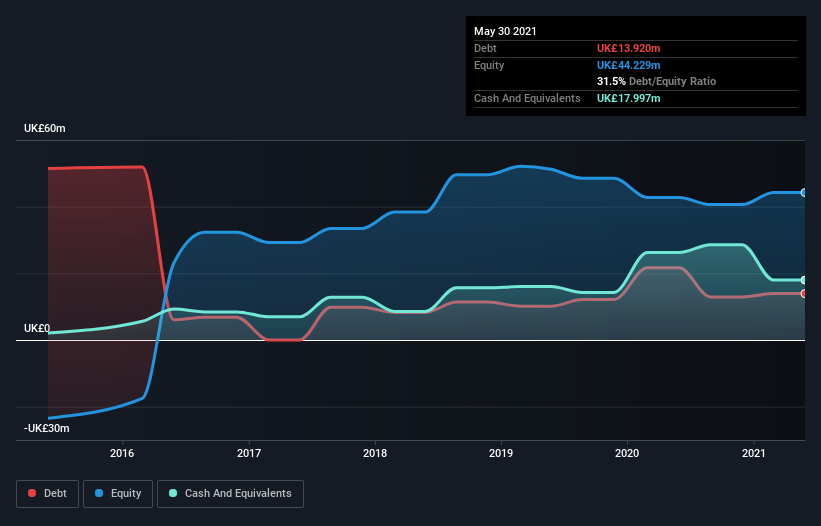Is Joules Group (LON:JOUL) Using Too Much Debt?
Howard Marks put it nicely when he said that, rather than worrying about share price volatility, 'The possibility of permanent loss is the risk I worry about... and every practical investor I know worries about.' When we think about how risky a company is, we always like to look at its use of debt, since debt overload can lead to ruin. We can see that Joules Group Plc (LON:JOUL) does use debt in its business. But is this debt a concern to shareholders?
What Risk Does Debt Bring?
Generally speaking, debt only becomes a real problem when a company can't easily pay it off, either by raising capital or with its own cash flow. If things get really bad, the lenders can take control of the business. However, a more common (but still painful) scenario is that it has to raise new equity capital at a low price, thus permanently diluting shareholders. Having said that, the most common situation is where a company manages its debt reasonably well - and to its own advantage. The first step when considering a company's debt levels is to consider its cash and debt together.
See our latest analysis for Joules Group
What Is Joules Group's Debt?
The image below, which you can click on for greater detail, shows that Joules Group had debt of UK£13.9m at the end of May 2021, a reduction from UK£21.7m over a year. However, its balance sheet shows it holds UK£18.0m in cash, so it actually has UK£4.08m net cash.
How Healthy Is Joules Group's Balance Sheet?
We can see from the most recent balance sheet that Joules Group had liabilities of UK£91.0m falling due within a year, and liabilities of UK£38.2m due beyond that. Offsetting these obligations, it had cash of UK£18.0m as well as receivables valued at UK£10.7m due within 12 months. So it has liabilities totalling UK£100.5m more than its cash and near-term receivables, combined.
Joules Group has a market capitalization of UK£227.4m, so it could very likely raise cash to ameliorate its balance sheet, if the need arose. But we definitely want to keep our eyes open to indications that its debt is bringing too much risk. While it does have liabilities worth noting, Joules Group also has more cash than debt, so we're pretty confident it can manage its debt safely.
Notably, Joules Group made a loss at the EBIT level, last year, but improved that to positive EBIT of UK£872k in the last twelve months. There's no doubt that we learn most about debt from the balance sheet. But ultimately the future profitability of the business will decide if Joules Group can strengthen its balance sheet over time. So if you're focused on the future you can check out this free report showing analyst profit forecasts.
Finally, a business needs free cash flow to pay off debt; accounting profits just don't cut it. While Joules Group has net cash on its balance sheet, it's still worth taking a look at its ability to convert earnings before interest and tax (EBIT) to free cash flow, to help us understand how quickly it is building (or eroding) that cash balance. Happily for any shareholders, Joules Group actually produced more free cash flow than EBIT over the last year. That sort of strong cash generation warms our hearts like a puppy in a bumblebee suit.
Summing up
While Joules Group does have more liabilities than liquid assets, it also has net cash of UK£4.08m. And it impressed us with free cash flow of UK£16m, being 1,866% of its EBIT. So we are not troubled with Joules Group's debt use. The balance sheet is clearly the area to focus on when you are analysing debt. However, not all investment risk resides within the balance sheet - far from it. For instance, we've identified 3 warning signs for Joules Group that you should be aware of.
If you're interested in investing in businesses that can grow profits without the burden of debt, then check out this free list of growing businesses that have net cash on the balance sheet.
This article by Simply Wall St is general in nature. We provide commentary based on historical data and analyst forecasts only using an unbiased methodology and our articles are not intended to be financial advice. It does not constitute a recommendation to buy or sell any stock, and does not take account of your objectives, or your financial situation. We aim to bring you long-term focused analysis driven by fundamental data. Note that our analysis may not factor in the latest price-sensitive company announcements or qualitative material. Simply Wall St has no position in any stocks mentioned.
Have feedback on this article? Concerned about the content? Get in touch with us directly. Alternatively, email editorial-team (at) simplywallst.com.

 Yahoo Finance
Yahoo Finance 
